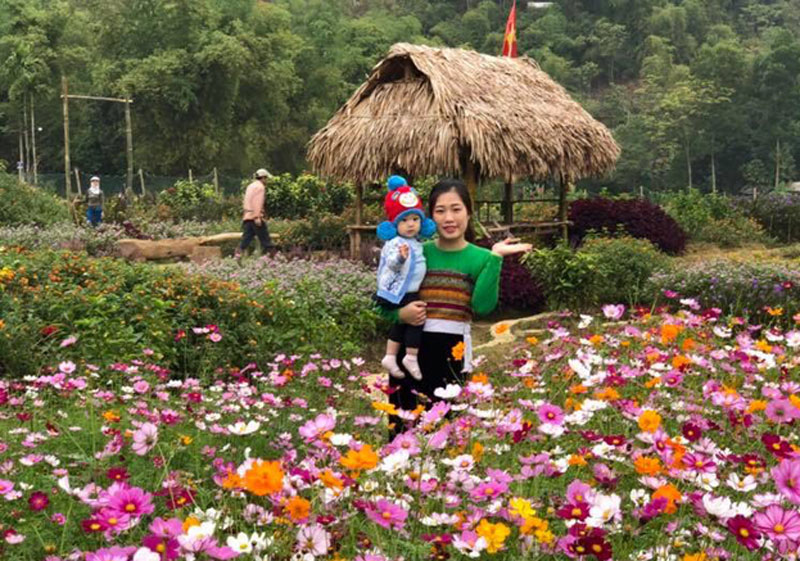
(HBO) – Lying in a road leading to downtown of Na Phon commune, Mai Chau district, the flower garden of Bao Quyen homestay facility looks colourful and striking with various flowers in bloom. On a site of over 3,000 square metres, beds of flowers are dotted with swing and panpipe miniatures.
In early 2017, the facility was officially put into
operation with modern architecture and well-furnished rooms with wifi, air
conditioning and clean toilets. In particular, there are things typical of Thai
culture such as houses on stilt, thatched roofs, palm leaves, brocade weaving
tools and traditional cuisine. Therefore, visitors to Bao Quyen homestay
facility can have calm space for relaxing while experiencing modern
conveniences.
Bao Quyen homestay facility could accommodate 50 guests, offer wide parking lot
and services such as fishing; bicycles, motorbikes and electric cars for rent,
mountaineering and cascade watching.
Young owner Ha Tuyet Trinh in colourful Bao Quyen flower garden welcoming
visitors in traditional Lunar New Year.
Apart from building the facility, Trinh also built the garden at the same
time.
She chose flower species that suit weather conditions in Moc Chau. At first,
she grew small trees but many of them died. Later, she learnt about seed sowing
technique.
Trinh said due to the lack of experience, not all flower seeds could germinate
and grow well. For example, a crop of buckwheat, balm mint and pansy flowers
could bloom but sunflowers faded out. Not discouraged, she became more
experienced after one year. In preparation for the Lunar New Year festival
2018, she planted popular species such as daisy and petunia.
She also made miniatures shaped house on stilt, Mong pan-pipe, swing, bamboo
ladder, making it easier for visitors to pose for photos. On economic
efficiency, Trinh said the garden costs 80 million VND, including 30 million
VND for land rent and 50 million VND for flower varieties, fertilisers and
salary for workers. Each ticket costs 10,000 VND per person on weekdays and 20
million VND per person on weekend or holidays. Visitor number counts from
dozens to 100 on usual day or 100 to hundreds from
Friday noon to Sunday morning. In the recent solar New Year
festival, the garden welcomed more than 1,000 visitors, which is the only in
community-based villages in Mai Chau town, Chieng Chau and Na Phon
communes.
According to data from the Hoa Binh Provincial Party Committee, the industrial production index for the first six months of 2025 is estimated to have increased by 20% compared to the same period last year. This marks the highest year-on-year growth rate for this period since 2020.
In the first six months of 2025, Hoa Binh province’s export turnover was estimated at 1.145 billion USD, marking an 18.11% increase compared to the same period in 2024. Import turnover was estimated at $ 804 million, a 17.15% increase, which helped the province maintain a positive trade balance.
The lives of the ethnic minority farmers in Tan Lac district have gradually improved thanks to the new directions in agricultural production. This is a testament to the collective strength fostered through the professional associations and groups implemented by various levels of the district’s Farmers’ Union.
With the motto the "product quality comes first,” after nearly one year of establishment and operation, Muong village’s Clean Food Agricultural and Commercial Cooperative, located in Cau Hamlet, Hung Son Commune (Kim Boi district), has launched reputable, high-quality agricultural products to the market that are well-received by consumers. The products such as Muong village’s pork sausage, salt-cured chicken, and salt-cured pork hocks have gradually carved out a place in the market and they are on the path to obtaining the OCOP certification.
In the past, the phrase "bumper harvest, rock-bottom prices" was a familiar refrain for Vietnamese farmers engaged in fragmented, small-scale agriculture. But today, a new spirit is emerging across rural areas of Hoa Binh province - one of collaboration, organisation, and collective economic models that provide a stable foundation for production.
Maintaining growing area codes and packing facility codes in accordance with regulations is a mandatory requirement for agricultural products to be eligible for export. Recently, the Department of Agriculture and Environment of Hoa Binh province has intensified technical supervision of designated farming areas and packing facilities to safeguard the "green passport" that enables its products to access international markets.



